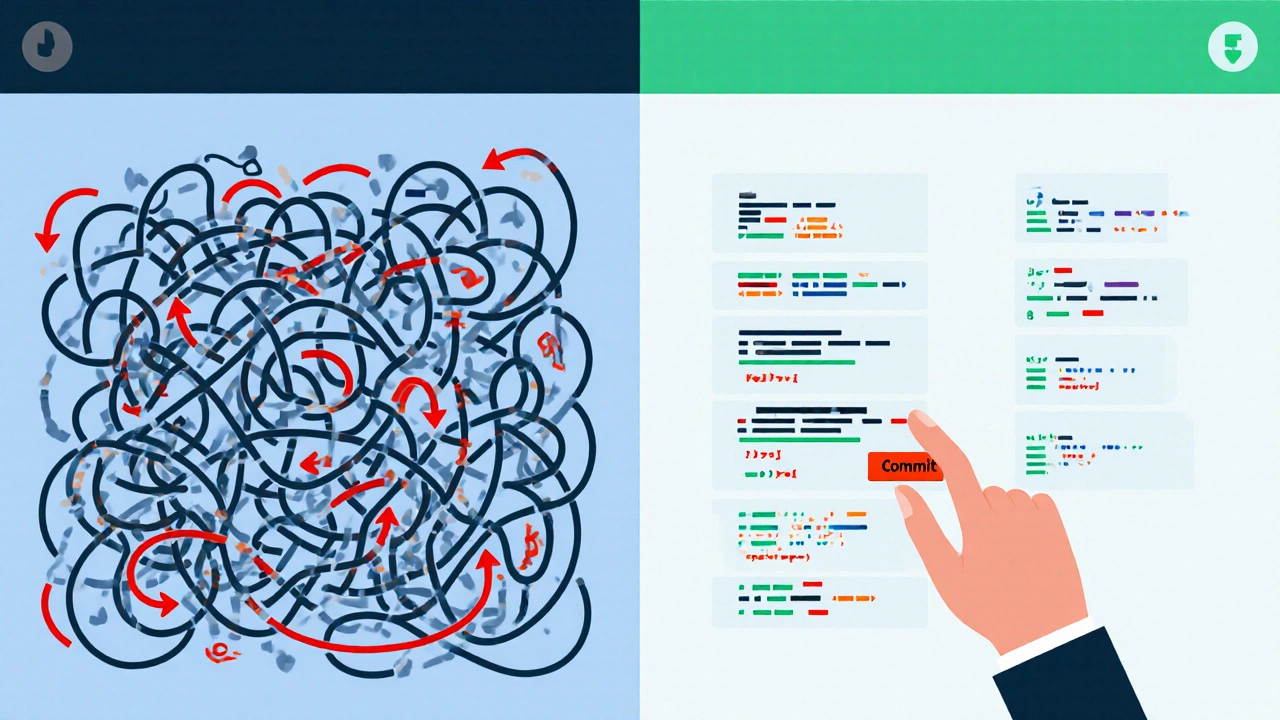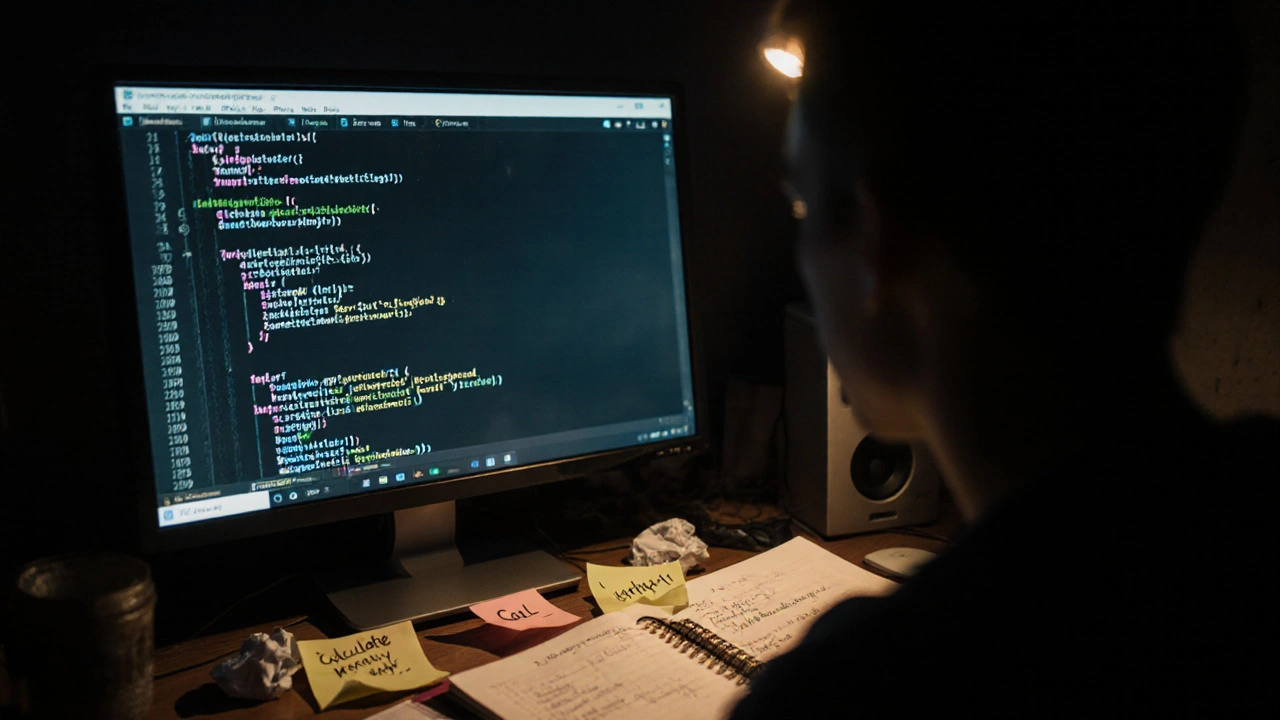Most programmers spend more time reading code than writing it. That’s the harsh truth. If your code is hard to follow, messy, or full of shortcuts, you’re not just slowing yourself down-you’re dragging down everyone else who touches it. The difference between good coders and great ones isn’t talent. It’s consistency. It’s the small habits that stack up over months and years. Here’s what actually works.
Write Code for People, Not Just Machines
Computers don’t care if your variable names are tmp1 or userRegistrationDate. But humans do. A year from now, you’ll look at your own code and wonder who wrote it. Make it easy for your future self to pick up where you left off.
Use names that tell a story. Instead of calc(), use calculateMonthlyInterest(). Instead of x, use totalCost. It takes three extra seconds to type, but saves ten minutes of confusion later. This isn’t about being verbose-it’s about being clear.
One developer at a fintech startup told me they reduced onboarding time for new hires by 60% just by renaming variables and adding one-line comments to complex functions. No new tools. No training sessions. Just better naming.
Break Problems Into Tiny Pieces
When you’re stuck on a bug or a feature, don’t try to solve the whole thing at once. Break it down. Ask: What’s the smallest piece I can test right now?
Let’s say you’re building a login system. Don’t start with the whole form, validation, database call, and session handling. Start with: Can I accept a username and password in a function? Can I check if they’re not empty? Can I return a simple success or error message? Then add one layer at a time.
This is called incremental development. It’s not new, but most beginners skip it because they think it’s slow. It’s actually faster. Why? Because you catch mistakes early. One small error is easier to fix than five tangled ones.
Use the rule of thumb: If a function is longer than 15 lines, it probably does too much. Split it. If a file has more than 200 lines, consider splitting it into modules. Small pieces are testable. Small pieces are reusable. Small pieces are understandable.
Test Early, Test Often
You don’t need to be a testing expert to write better code. You just need to test before you assume it works.
Write one test for every new function you create. Even if it’s just checking that a function returns the right type. For example:
- Does
formatPhoneNumber()return a string? - Does
validateEmail()return false for"not-an-email"?
Automated tests don’t have to be fancy. In Python, use assert. In JavaScript, use console.assert(). In any language, write a quick script that runs your function with known inputs and checks the output. Run it every time you make a change.
A study from the University of Washington found that developers who wrote even minimal tests fixed bugs 40% faster than those who didn’t. Why? Because they knew exactly where the problem was. No guessing. No hunting through logs.

Learn to Read Error Messages
Most developers panic when they see a long error message. They copy-paste it into Google and hope for the best. That’s not learning. That’s luck.
Error messages are clues. Read them like a detective. Look at the last line-it usually tells you what went wrong. Then trace upward. The file name and line number are your map. Don’t ignore the stack trace.
For example:
TypeError: Cannot read property 'name' of undefined
This isn’t magic. It means you tried to access someObject.name, but someObject was undefined. Now ask: Where did someObject come from? Was it supposed to be loaded from an API? Did you forget to check if it existed?
Spending five minutes reading the error message saves two hours of debugging. Learn to trust the tools. They’re not trying to confuse you-they’re trying to help.
Use Version Control Like a Pro
Git isn’t just for teams. It’s your safety net. Every time you make a meaningful change-fix a bug, add a feature, restructure a file-commit it. Write a clear message: "Fix login error when email is empty", not "fixed stuff".
Why? Because when you break something later, you can roll back. You can compare changes. You can see exactly what you did three days ago.
One habit that changes everything: commit before you start a big change. That way, if it goes sideways, you can undo it with one command. No panic. No lost work.
And never push directly to main. Always use branches. Even if you’re working alone. Branches keep your main branch clean. They let you experiment without breaking things.
Stop Copy-Pasting Code
It’s tempting. You find a snippet online that does exactly what you need. You copy it. You paste it. You move on.
But here’s what happens next: You don’t understand how it works. You can’t fix it when it breaks. You can’t adapt it when requirements change. And worst of all-you might be copying broken code.
Instead, type it out. Even if it’s slow. Even if it feels stupid. When you type it, your brain processes it. You start to notice patterns. You remember why certain lines are there.
One developer I know rewrote a whole authentication system from scratch-just by typing out examples from docs. He didn’t understand OAuth at first. By the time he finished typing, he did. And he never had to debug it again.

Build Something Real, Even If It’s Small
Tutorials are great. But they don’t teach you how to solve messy, real problems. You need to build something that matters to you.
Not a todo app. Not a calculator. Build something that solves a real annoyance in your life. A script that auto-fills your expense reports. A tool that organizes your photos by date. A bot that reminds you to drink water.
When you care about the outcome, you’ll push through the hard parts. You’ll research. You’ll debug. You’ll refactor. You’ll learn more in one real project than in ten tutorials.
One person built a script to auto-sort their Netflix queue by release year. It took three days. They learned Python, file handling, APIs, and error handling. Now they’re a junior developer at a startup.
Read Code Every Day
Great coders don’t just write code. They read it. Open-source projects on GitHub are goldmines. Find a project you like. Read the code. See how they structure files. How they name functions. How they handle errors.
You don’t need to understand it all. Just notice one thing each day. Why did they put this function here? Why did they use a switch instead of if-else? What’s the comment saying that the code doesn’t?
After a month, you’ll start seeing patterns. You’ll recognize good code when you see it. And you’ll start writing it naturally.
Consistency Beats Genius
You don’t need to be the smartest person in the room. You don’t need to know every framework. You just need to show up and do the small things right-every day.
Write clear names. Break problems down. Test often. Read errors. Commit often. Type instead of copy. Build something real. Read code daily.
These aren’t tricks. They’re habits. And habits compound. One day, you’ll look back and realize you’ve become the person everyone asks for help. Not because you’re a wizard. But because you did the boring stuff right.
What’s the most important coding tip for beginners?
The most important tip is to write code that’s easy for humans to read. Use clear variable names, break functions into small pieces, and add simple comments when needed. Clean code saves you time, reduces bugs, and makes collaboration possible.
Do I need to learn testing to be a good coder?
You don’t need to be an expert, but you do need to test. Even basic checks-like making sure a function returns the right type or handles empty inputs-prevent 70% of common bugs. Start with simple assertions in your language of choice. It’s not about perfection; it’s about catching mistakes early.
How do I stop copying code from Stack Overflow?
Type it out instead of copy-pasting. Even if it’s slow. When you type, your brain processes the logic. You start to understand why each line exists. Over time, you’ll remember patterns and stop needing to copy at all. You’ll also avoid broken or outdated code.
Why is version control so important for solo developers?
Version control is your undo button. It lets you experiment without fear. If you break something, you can roll back. If you forget what you changed, you can compare versions. Even if you work alone, branches and commits protect your work and make progress visible.
How can I get better at reading error messages?
Start by reading the last line-it usually tells you the exact error. Then trace up to the file and line number. Ask: What variable or function caused this? What was it supposed to be? Most errors are simple mismatches, not mysteries. Practice reading them daily, and they’ll stop scaring you.
What should I build to improve my coding skills?
Build something that solves a real problem you have. Not a tutorial project. Something that makes your life easier-a script that auto-saves your browser tabs, a tool that organizes your music files, a reminder bot. When you care about the result, you’ll learn deeply and remember what you built.
If you want to get better at coding, stop chasing new tools and frameworks. Focus on the quiet, consistent habits that make code readable, reliable, and maintainable. That’s the secret sauce. Not brilliance. Not luck. Just discipline.

